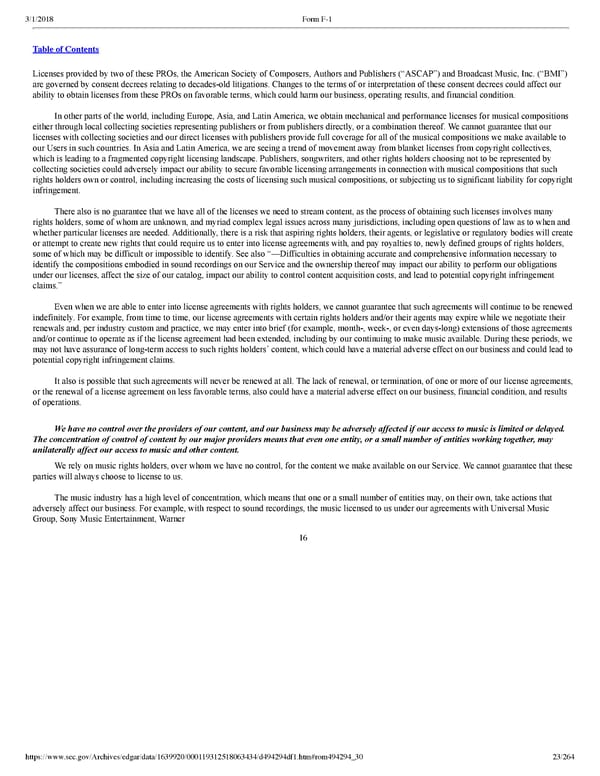23/264 Licenses provided by two of these PROs, the American Society of Composers, Authors and Publishers (“ASCAP”) and Broadcast Music, Inc. (“BMI”) are governed by consent decrees relating to decadesold litigations. Changes to the terms of or interpretation of these consent decrees could affect our ability to obtain licenses from these PROs on favorable terms, which could harm our business, operating results, and financial condition. In other parts of the world, including Europe, Asia, and Latin America, we obtain mechanical and performance licenses for musical compositions either through local collecting societies representing publishers or from publishers directly, or a combination thereof. We cannot guarantee that our licenses with collecting societies and our direct licenses with publishers provide full coverage for all of the musical compositions we make available to our Users in such countries. In Asia and Latin America, we are seeing a trend of movement away from blanket licenses from copyright collectives, which is leading to a fragmented copyright licensing landscape. Publishers, songwriters, and other rights holders choosing not to be represented by collecting societies could adversely impact our ability to secure favorable licensing arrangements in connection with musical compositions that such rights holders own or control, including increasing the costs of licensing such musical compositions, or subjecting us to significant liability for copyright infringement. There also is no guarantee that we have all of the licenses we need to stream content, as the process of obtaining such licenses involves many rights holders, some of whom are unknown, and myriad complex legal issues across many jurisdictions, including open questions of law as to when and whether particular licenses are needed. Additionally, there is a risk that aspiring rights holders, their agents, or legislative or regulatory bodies will create or attempt to create new rights that could require us to enter into license agreements with, and pay royalties to, newly defined groups of rights holders, some of which may be difficult or impossible to identify. See also “—Difficulties in obtaining accurate and comprehensive information necessary to identify the compositions embodied in sound recordings on our Service and the ownership thereof may impact our ability to perform our obligations under our licenses, affect the size of our catalog, impact our ability to control content acquisition costs, and lead to potential copyright infringement claims.” Even when we are able to enter into license agreements with rights holders, we cannot guarantee that such agreements will continue to be renewed indefinitely. For example, from time to time, our license agreements with certain rights holders and/or their agents may expire while we negotiate their renewals and, per industry custom and practice, we may enter into brief (for example, month, week, or even dayslong) extensions of those agreements and/or continue to operate as if the license agreement had been extended, including by our continuing to make music available. During these periods, we may not have assurance of longterm access to such rights holders’ content, which could have a material adverse effect on our business and could lead to potential copyright infringement claims. It also is possible that such agreements will never be renewed at all. The lack of renewal, or termination, of one or more of our license agreements, or the renewal of a license agreement on less favorable terms, also could have a material adverse effect on our business, financial condition, and results of operations. We have no control over the providers of our content, and our business may be adversely affected if our access to music is limited or delayed. The concentration of control of content by our major providers means that even one entity, or a small number of entities working together, may unilaterally affect our access to music and other content. We rely on music rights holders, over whom we have no control, for the content we make available on our Service. We cannot guarantee that these parties will always choose to license to us. The music industry has a high level of concentration, which means that one or a small number of entities may, on their own, take actions that adversely affect our business. For example, with respect to sound recordings, the music licensed to us under our agreements with Universal Music Group, Sony Music Entertainment, Warner 16
 Spotify F1 | Interactive Prospectus Page 22 Page 24
Spotify F1 | Interactive Prospectus Page 22 Page 24